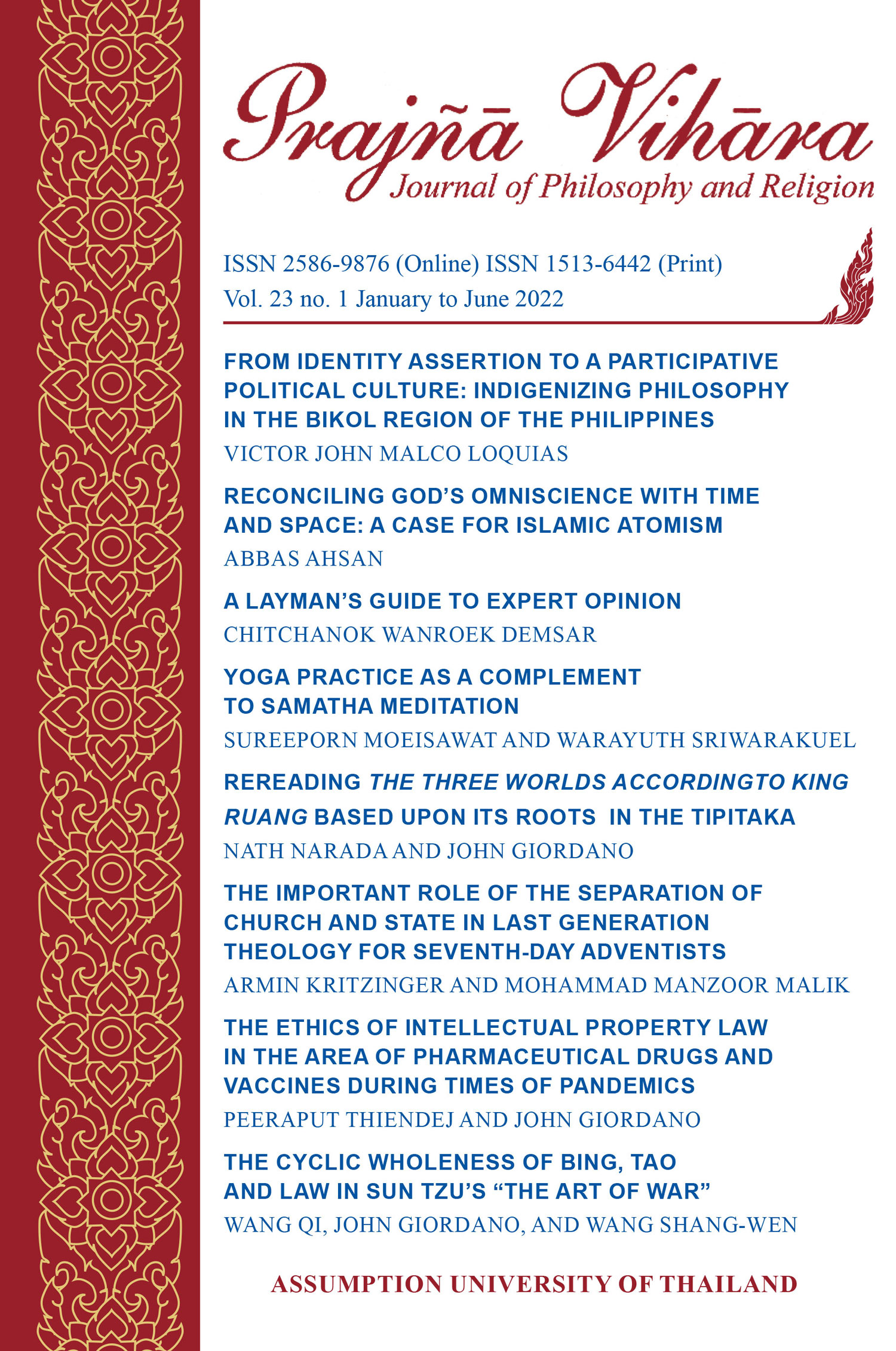FROM IDENTITY ASSERTION TO A PARTICIPATIVE POLITICAL CULTURE: INDIGENIZING PHILOSOPHY IN THE BIKOL REGION OF THE PHILIPPINES
Abstract
The attempt to develop an indigenizing philosophy in the
Bikol region of the Philippines can be seen as an attempt
to aid the creation of a collective identity for the purpose
of addressing local socio-political concerns. The task of
philosophy is directed to the empowerment of people by
allowing them to engage in philosophical thought in their
native language and cultural context. Philosophy also
becomes directed towards social critique and the goals
of justice, recognition and emancipation. Using Axel
Honneth’s critical theory, indigenous philosophizing is here
presented as internal critique of culture-specific values in
order to develop a more engaged and participative political
culture that can be carried out in academic institutions and
operate as a social precondition of democracy.
References
Carpio, Jose. M. (2001). Katanosan and Kaibahan: Bikolano Social
Consciousness. Hingowa The Holy Rosary Seminary Journal 4(2),
-106.
Cordero, Kristian S. (2003). Apologia ni Sokrates. Pagpukaw An Invitation
to Philosohize 3, 59-86.
Cordero, Kristian S. (2006). SANTIGWAR Mga Rawitdawit sa Bikol asin
Filipino. Naga City: Goldprint Publishing.
Cordero, Kristian S. (2013). Canticos Apat na Boses. Manila: University
of Santo Tomas Publishing House.
Cordero, Kristian S. (2014). Imagining the Indigene: A Reading on the
Agta in Bikol Writings. Bikol Studies Perspectives and Advocacies
(1), 26-47.
de Guia, Katrin. (January-December 2013). Indigenous Values for
Sustainable Nation Building. Prajna Vihara 14(1-2), 175-192.
Enriquez, Virgilio. (1992). From Colonial to Liberation Psychology.
Quezon City: U.P. Press.
Gregg, Benjamin. (2019). Indigeneity as Social Construct and Political
Tool. Human Rights Quarterly 41, 823-848.
Hidayat, Ferry. (July-December 2015). On the Struggle for Recognition
of Southeast Asian and Regional Philosophy. Prajñā Vihāra 16(2),
-52.
Honneth, Axel. (1995). The Struggle for Recognition: The Moral Grammar
of Social Conflicts. Cambridge: Polity Press.
Honneth, Axel. (1998). Democracy as Reflexive Cooperation: John Dewey
and the Theory of Democracy Today. Political Theory 26(6), 763-
Honneth, Axel. & Margalit, Avishai. (2001). Invisibility: On the
Epistemology of Recognition. Proceedings of the Aristotelian
Society 75, 111-139.
Prajñā Vihāra Vol. 23 no. 1 January to June 2022
Honneth, Axel. (2007). Disrespect: The Normative Foundations of Critical
Theory. Cambridge: Polity Press.
Honneth, Axel. (2014). Freedom’s Right: The Social Foundations of
Democratic Life. Cambridge: Polity Press.
Honneth, Axel. (2015). Education and the Democratic Public Sphere:
A Neglected Chapter of Political Philosophy. In Lysaker, O. &
Jakobsen, J., Recognition and Freedom. Axel Honneth’s Political
Thought (pp. 17-32). Leiden: Brill.
Honneth, Axel. (2017). The Idea of Socialism: Towards a Renewal.
Cambridge: Polity Press.
Ibana, Rainier A. (2009). Grafting Philosophy to the Tagalog Prefix KA.
Kritika Kultura 12, 27-60.
Ibana, Rainier. (2001). Towards a Bikolano Philosophical Research
Program. Hingowa The Holy Rosary Seminary Journal 4(2), 61-66.
Lysaker, Odin. & Jakobsen, Jonas (2015). Introduction: Recognition and
Freedom in Axel Honneth’s Political Thought. In O. L. Jakobsen,
Recognition and Freedom: Axel Honneth’s Political Thought (pp.
-16). Leiden: Brill.
Kaelin, Lukas. (2012). Strong Family, Weak State: Hegel’s Political
Philosophy and the Filipino Family. Quezon City: Ateneo de
Manila University Press.
Loquias, Victor John. (2019). Axel Honneth’s Critical Pedagogy for a
Renewed Socialist-Global Society. Social Ethics Society Journal
of Applied Philosophy, 99-140.
Marcelo, Gonçalo. (2013). Recognition and Critical Theory Today: An
Interview with Axel Honneth. Philosophy and Social Criticism
(2), 209-221.
Pada, R. T. (2017). Axel Honneth’s Social Philosophy of Recognition:
Freedom, Normativity, and Identity. Newcastle upon Tyne:
Cambridge Scholars Publishing.
Pilapil, Renante. (2015). Recognition: Examining Identity Struggles. Quezon
City: Ateneo de Manila University Press.
Victor John Malco Loquias 23
Remodo, A. (2014). Sadiring Tawo: From Familial to Oligarchic Politics.
Bikol Studies: Perspectives and Advocacies 1(1), 5-25.
Schweiger, Gottfried. (2012). Globalizing Recognition: Global Justice and
the Dialectic of Recognition. Public Reason 4(1-2), 78-91.
The Government of the Philippines. (1998). “Republic Act No. 8371:
Indigenous People’s Rights Act of 1997 and Its Implementing
Rules and Regulations.”. Metro Manila : National Commision on
Indigenous Peoples.
Tria, Wilmer Joseph. (2006). Developing Indigenous Philosophies. Gibon
Ateneo de Naga University Journal 6(1), 1-14.
Tria, Wilmer Joseph. (2009). Ako asin an Kapwa Ko Sarong Pilosopiya
nin Tawo. Naga City: Ateneo de Naga University.
Zialcita, Fernando N. (2005). Authentic Though Not Exotic. Quezon City:
Ateneo de Manila Press.
Downloads
Published
Issue
Section
License
Consent to Publish and Transfer of Copyright
By publishing in Prajñā Vihāra, the author agrees to transfer and assign to Assumption University of Thailand as the Publisher of the Journal, the copyright to the Article in any form, including any and all rights, interests and claims related to it.
The author does retain the following rights:
- The right to make further copies of the published article for their use in classroom teaching.
- The right to reuse all or part of the published article in a compilation of his or her own works or in textbooks of which they are the author or coauthor.
- The right to make copies of the published article for internal distribution within their academic institution.
- All proprietary rights other than copyright, such as patent rights.
- The Article is his or her original work, and has not been published previously and is not under consideration for publication elsewhere.
- It does not contain any matter that is obscene, libelous, or contrary to law.
- They have obtained the necessary license or written authority and paid any and all related fees for the use and reproduction of text, tables, illustrations and other copyrighted work from the owners of the intellectual property rights, and can furnish the Publisher copies of the license/written authority and proof of payment of related fees upon the signing of this Agreement.
- They have the consent of the Co-Authors of the article upon the signing of this Agreement.
- In the event that they intend to republish, reprint or translate all or part of the Article in other publications, they will secure the prior written permission from the journal Editor.
Prajñā Vihāra adopts the Creative Commons Attribution (CC BY-NC-ND) license


